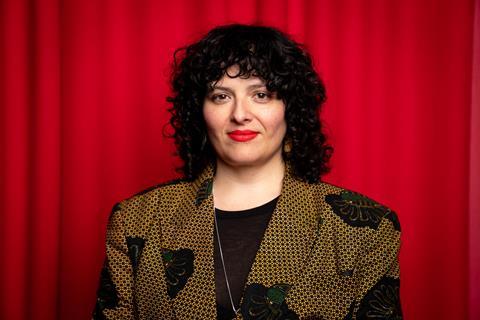
The CPH:Forum project presentations get underway today (Monday, March 18) at the first edition for new CPH:DOX head of industry and training Mara Gourd-Mercado.
Gourd-Mercado joined the documentary event in May last year, from the Academy of Canadian Cinema & Television where she was executive director of the Quebec section. She moved to Copenhagen in August once her work visa came through.
Previously, she was executive director of Montreal International Documentary Festival (RIDM) from 2015 to 2020.
The Argentinean-Canadian executive will oversee the CPH:Forum pitching event, which has 32 projects including new works from Flee producer Signe Byrge Sorensen and Cow producer Kat Mansoor. Gourd-Mercado will also run the five-day Conference programme with talks by Alex Gibney and Asmae El Moudir, plus a session titled ‘Our Declaration Of Independence’; the Inter:Active Symposium on new forms of storytelling; and the Talents and Academy strands, for training emerging documentary filmmakers.
She speaks to Screen about her experience in sponsorship, developing the industry offering, and creating a safe space for discussions.
What does your experience at RIDM bring to CPH:Industry?
North America has a very developed culture of sponsorship; we can’t rely only on public institutions. [I bring] that experience of having grown a budget - in my tenure at RIDM we doubled the budget in five years. I have experience in partnerships; I also come from a communications and PR background before I was working at RIDM. I am an experienced manager, whether it be maximising the potential of a budget or HR management, which is always complicated in festivals with the turnaround and not having the same staff year after year.
How have you spent the nine months since your appointment last year?
Industry is huge at CPH:DOX, so I’m finding my way through all the activities that we do. It was a lot of getting to know the activities and how they’re done: the financing, the ins and outs of applications, the reporting etc. Then getting to know the team and working with them; you have to find your place and see how people work and how you can work together.
How are you looking to develop the industry offering?
We’ve started a focus on emerging filmmakers with the Intro:Dox programme [March 17-18], where we welcome a cohort of 100 emerging filmmakers working on their first or second feature, from all over the world. People sign up through film institutions in their countries or on their own; that’s a great door to expand our activities. The idea is also to grow a space where if you don’t necessarily have a specific project, there are still activities where you can formally or informally meet with your peers or potential collaborators.
What does the independence session offer?
That session is about establishing common language. The streamers talk about independent production and filmmakers, but it doesn’t necessarily mean the same thing for them as it does for an independent producer based in Burkina Faso, for example. [The session is] to establish the baseline of what independence is; and be able to go to streamers and say ‘what you are saying you promote as independent filmmaking is not really that’ - or maybe it is. Once we’ve established common language, it becomes easier to fight for independence and to get the financing that those films deserve.
How do you plan to make CPH:Industry a safe space for discussion on the political issues of the day?
We’ve been thinking about this since before October 7. What’s important is how you build dialogue in a moment when everything is at extremes, and where emotions are running so high that anything can spark a very heated discussion or something more. We have [Palestinian artist] Larissa Sansour talking at the conference, on a panel on looking back at conflicts. It’s about empathy; it sounds very ‘let’s take a ukulele and play kumbaya’ but I do think you can’t work in documentary and not have empathy. It’s really hard to do that! The ‘materia prima’ [translation: raw material] is usually alive – it’s animals or humans. We understand that people are suffering. A lot of people don’t know how to put words on those emotions and to put words on what they’re feeling; it’s a sense of loss of control people are experiencing in this time.







![The Brightest SunScreen[Courtesy HKIFF]](https://d1nslcd7m2225b.cloudfront.net/Pictures/274x183/3/5/0/1448350_thebrightestsunscreencourtesyhkiff_312678.jpg)


























No comments yet